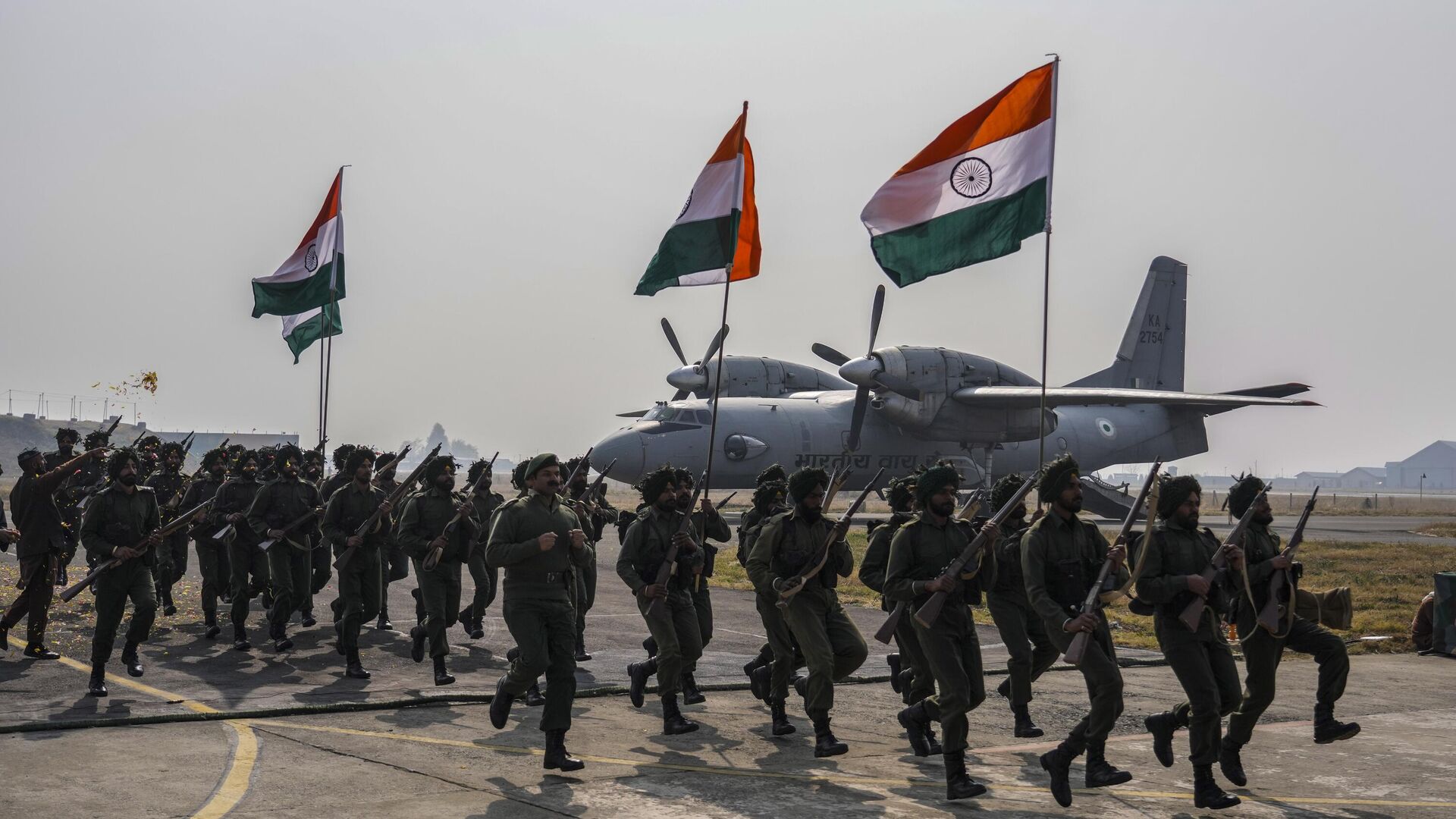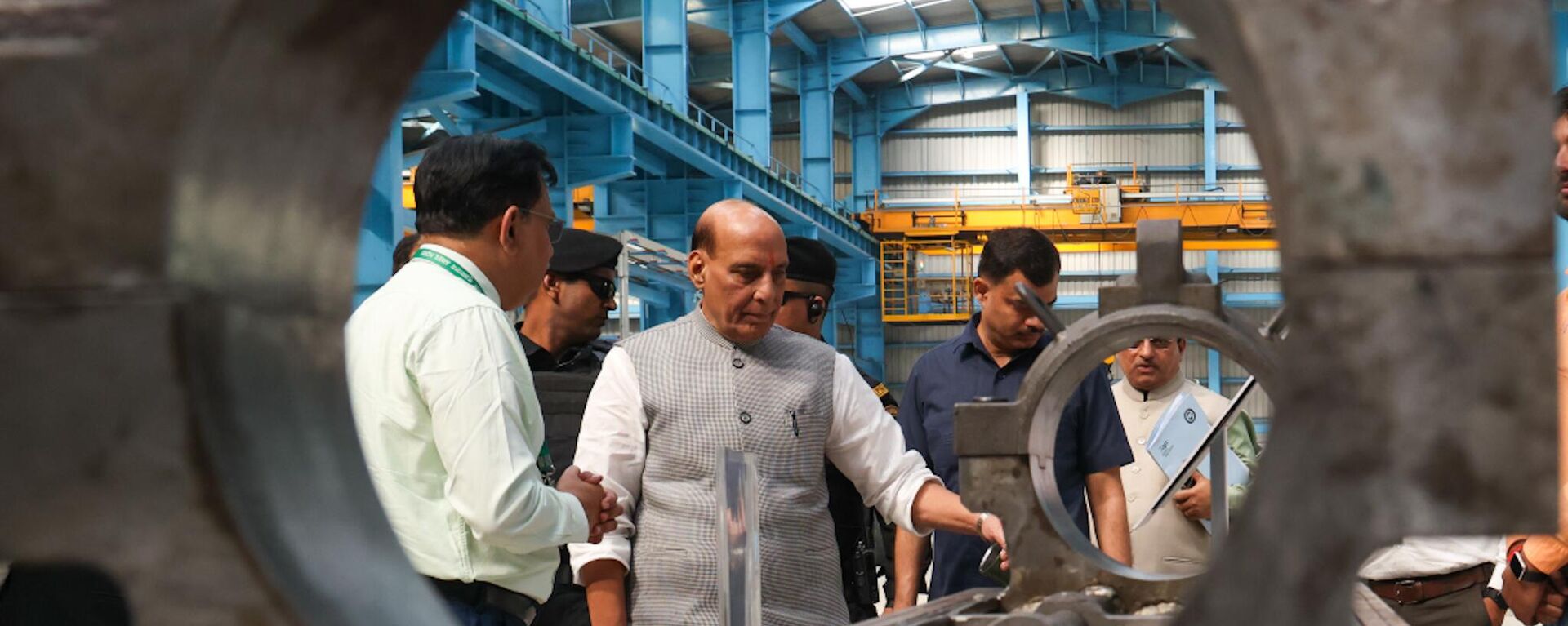https://sputniknews.in/20250912/indias-hard-power-becoming-more-and-more-critical-defence-secretary-9752303.html
India's Hard Power Becoming More and More Critical: Defence Secretary
India's Hard Power Becoming More and More Critical: Defence Secretary
Sputnik India
Earlier this year, India's hard power, that is, its military might, proved to be a decisive factor during the country's counter-terrorism campaign, Operation... 12.09.2025, Sputnik India
2025-09-12T19:48+0530
2025-09-12T19:48+0530
2025-09-12T19:48+0530
defenсe news
india
pakistan
ukraine
indian air force (iaf)
s-400 air defense systems
operation sindoor
brahmos supersonic cruise missile
missiles
counter-terrorism
https://cdn1.img.sputniknews.in/img/07e8/03/1b/6960090_0:178:3008:1870_1920x0_80_0_0_bc999815968f5d9f8dc88b066045d752.jpg
Defence Secretary Rajesh Kumar Singh on Friday underlined that India's hard power was becoming more and more critical in the current geopolitical scenario, where "economic protectionism" was emerging as a key tool to subdue developing nations.Among other factors that he cited were causing large-scale disruptions in the present world order were economic fragmentation, the various conflicts from Ukraine to Gaza, and the decline of multilateral institutions.It is worth noting that India's military superiority allowed it to dominate the military confrontation against Pakistan in May this year. After New Delhi conducted precision strikes on terrorist hideouts across nine locations in Pakistan and Pakistan-Occupied Kashmir (PoK), the two nuclear-armed nations launched missiles and drones at each other - while India managed to thwart Pakistani attempts at causing damage to its military installations, thanks to a robust air defence shield led by the S-400, Pakistan's air bases and other vital defence facilities suffered significant damage after the Indian Air Force (IAF) dropped BrahMos missiles, including at the Nur Khan airbase in Rawalpindi, the city that houses the headquarters of Islamic Republic's Army.The Defence Secretary stressed that two of the biggest determinants of a war were technological superiority and industrial strength, and that's why the pace of the defence industry's growth was vital for achieving the goals of Aatmanirbhar Bharat (Self-Reliant India), Viksit Bharat (Developed India), and a $30 trillion economy by 2047, when the world's largest democratic state will celebrate the centenary of its independence.
https://sputniknews.in/20250811/no-force-can-stop-indias-rise-as-global-power-rajnath-singh-9578611.html
india
pakistan
ukraine
delhi
new delhi
islamabad
Sputnik India
feedback.hindi@sputniknews.com
+74956456601
MIA „Rossiya Segodnya“
2025
Pawan Atri
https://cdn1.img.sputniknews.in/img/07e6/0c/13/139630_147:0:831:684_100x100_80_0_0_8fa2b25903e7787fe6a2698552c167df.png
Pawan Atri
https://cdn1.img.sputniknews.in/img/07e6/0c/13/139630_147:0:831:684_100x100_80_0_0_8fa2b25903e7787fe6a2698552c167df.png
News
en_IN
Sputnik India
feedback.hindi@sputniknews.com
+74956456601
MIA „Rossiya Segodnya“
Sputnik India
feedback.hindi@sputniknews.com
+74956456601
MIA „Rossiya Segodnya“
Pawan Atri
https://cdn1.img.sputniknews.in/img/07e6/0c/13/139630_147:0:831:684_100x100_80_0_0_8fa2b25903e7787fe6a2698552c167df.png
india, pakistan, ukraine, indian air force (iaf), s-400 air defense systems, operation sindoor, brahmos supersonic cruise missile, missiles, counter-terrorism, gdp, self-reliant india, delhi, new delhi, islamabad
india, pakistan, ukraine, indian air force (iaf), s-400 air defense systems, operation sindoor, brahmos supersonic cruise missile, missiles, counter-terrorism, gdp, self-reliant india, delhi, new delhi, islamabad
India's Hard Power Becoming More and More Critical: Defence Secretary
Earlier this year, India's hard power, that is, its military might, proved to be a decisive factor during the country's counter-terrorism campaign, Operation Sindoor, against Pakistan.
Defence Secretary Rajesh Kumar Singh on Friday underlined that India's hard power was becoming more and more critical in the current geopolitical scenario, where "economic protectionism" was emerging as a key tool to subdue developing nations.
Among other factors that he cited were causing large-scale disruptions in the present world order were economic fragmentation, the various conflicts from Ukraine to Gaza, and the decline of multilateral institutions.
"There is a need to back our soft power as hard power is becoming more and more critical," Singh said while addressing the inaugural Synergy of Technology, Research & Defence Ecosystem (STRIDE) seminar in Pune, Maharashtra.
It is worth noting that India's military superiority allowed it to dominate the military confrontation against Pakistan in May this year. After New Delhi conducted precision strikes on terrorist hideouts across nine locations in Pakistan and Pakistan-Occupied Kashmir (PoK), the two nuclear-armed nations launched missiles and drones at each other - while India managed to thwart Pakistani attempts at causing damage to its military installations, thanks to a
robust air defence shield led by the S-400, Pakistan's air bases and other vital defence facilities suffered significant damage after the
Indian Air Force (IAF) dropped
BrahMos missiles, including at the
Nur Khan airbase in Rawalpindi, the city that houses the headquarters of Islamic Republic's Army.
The Defence Secretary stressed that two of the biggest determinants of a war were technological superiority and industrial strength, and that's why the pace of the defence industry's growth was vital for achieving the goals of Aatmanirbhar Bharat (Self-Reliant India), Viksit Bharat (Developed India), and a $30 trillion economy by 2047, when the world's largest democratic state will celebrate the centenary of its independence.
"The transition is critical to the broader issue of becoming a developed nation of innovation, enhancing India's startup culture, widening our industrial base, increasing the share of manufacturing in our GDP, and generating employment and the spin-off benefits that come from the dual use of technology," he underscored.



